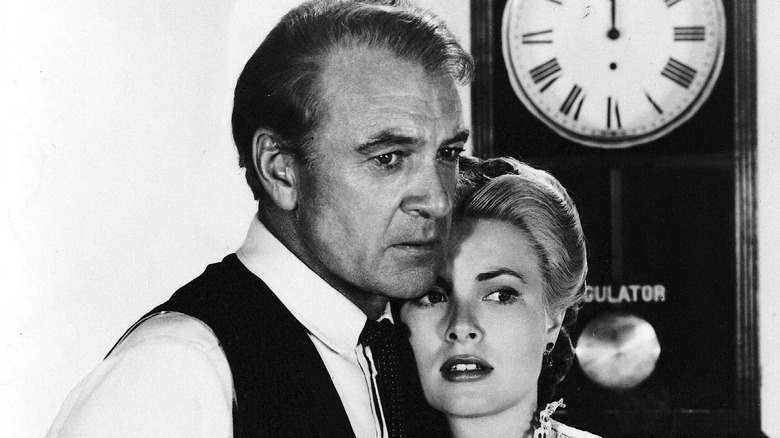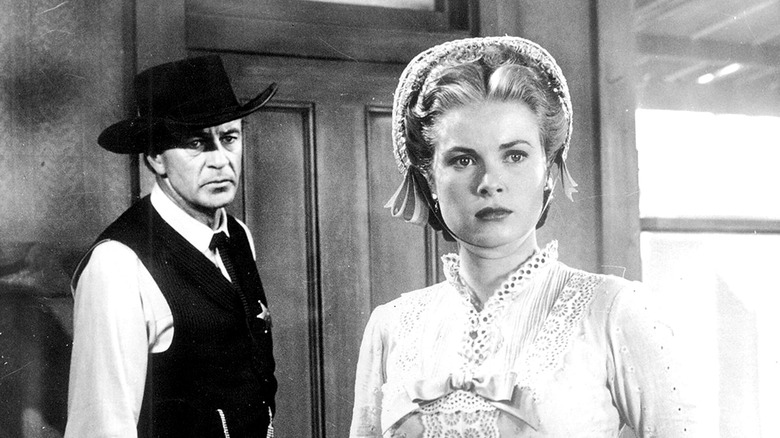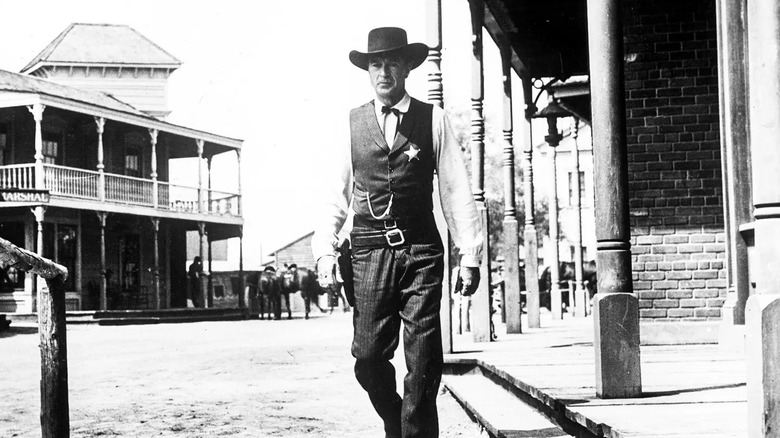Gary Cooper's Highest-Rated Western On Metacritic Is A Certified Classic
When you think of old-fashioned movie stars, few people are more apt to come to mind than Gary Cooper. Cooper was the embodiment of his name: a solid, straightforward presence who captured audience attention for decades. His career spanned from 1925 to 1961, and his legacy lives on more than sixty years later through his roles in classics like "The Pride of the Yankees," "Mr. Deeds Goes to Town," and other Old Hollywood titles. Though he passed in 1961, Cooper's legend is such that he's never really left our minds, even as an avatar of old-fashioned masculinity without seeming a bit outsized or exaggerated. Cooper was a quintessentially American star, having won two Best Actor Oscars during his life as well. One of those Oscars was for the early-1940s title "Sergeant York," but it's the other film he won for that we'll discuss today.
As many classics as Cooper has, just one reigns supreme on his Metacritic page. While it is technically true that two other films rank higher on the list, it's fair to say that neither of them truly count. One is the recent documentary "I Am Not Your Negro," an excellent film to be sure but not one in which he stars. The other is arguably among the greatest comedies of all time, "Monty Python and the Holy Grail," in which Cooper's name is listed among the "Special Thanks" in the opening credit as a brief, blink-and-you'll-miss-it visual gag. But no, if we remove those two, we're left with a film that not only netted Cooper his last Best Actor Oscar, but one of the most memorable and iconic Westerns of all time. It's none other than the bona fide classic from 1952, "High Noon."
More than 70 years later, High Noon is still one of the most resonant and political revisionist Westerns ever made
At its most simple, "High Noon" is a story of one man standing up for what he believes is right in the face of everyone else disagreeing. Cooper plays Marshal Will Kane, who's prepared to leave behind the small town of Hadleyville, New Mexico and ride off in the sunset with his Quaker bride Amy Fowler (Grace Kelly, in one of her first film roles). But when Kane learns that the vicious criminal Frank Miller, who he had previously sent to jail, is coming to town a day before the arrival of the new marshal, he decides that he needs to stay to protect the town until the transition can occur smoothly. The problem is, absolutely no one else wants to help Kane, for various reasons. Amy simply wants to leave town to ensure they can be safe and together, but Kane believes Miller and his gang will hunt him down no matter what. Everyone else in Hadleyville avoids helping out of self-preservation or flat-out cowardice, leading to a tense and breathless climax where Kane stands alone at the eponymous hour and has to fend off the bad guys.
"High Noon," which has an 89 on Metacritic, was not a film without controversy when it was developed and released. Arriving in 1952 and depicting a man who refuses to give into the crowd that would rather do the easy thing instead of the right thing was seen by some, including Western icon John Wayne, as an allegory against the blacklisting of actors and writers by the House Un-American Activities Committee, which was ostensibly meant to root out Communism but was largely an insulting and disastrous witch hunt against anyone who Senator Joseph McCarthy thought held beliefs different from his own. Wayne disliked the film so much, as did the legendary director Howard Hawks, that they would collaborate on an entirely different Western classic, "Rio Bravo," in response. (This, in spite of the fact that Wayne could say that the "High Noon" star indirectly gave him his first big break.) Considering that the film's screenwriter, Carl Foreman, was called to the HUAC tribunals and refused to name names of anyone who may have held Communist beliefs, it's not unfair to see Wayne's point of view (though it is fair to criticize him for being bothered by such an allegorical story). Even the film's producer, Stanley Kramer, chafed against Foreman's refusal to name names and wanted to end their creative partnership.
Though Cooper held similar political beliefs to John Wayne, his presence in High Noon guaranteed it an iconic status
Whatever John Wayne thought, it's worth noting that Gary Cooper was also a fellow conservative among Western stars and he wasn't as bothered by the political allegory at play in "High Noon." (He also felt that "High Noon" saved him from a late-stage career replete with terrible scripts.) And despite the controversy of the film itself, "High Noon" did quite well once all was said and done. Although some critics and audiences of the day were surprised that the Western had far less of the old-fashioned gunplay of the genre they'd come to expect, it did reasonably well at the box office and wound up winning four Oscars. Including Cooper's Best Actor award, it also won the Best Editing, Best Original Score, and Best Original Song Oscars, and was nominated for Best Picture and Best Director. (Kramer and the film's director, Fred Zinnemann, would lose for this specific film. Kramer would eventually win a memorial Oscar, and Zinnemann won as director and producer of "A Man for All Seasons.")
"High Noon" is indeed one of the great Westerns of all time, and also heralded the beginning of an era in which actors and directors felt more at ease in playing with audience expectations of what a Western was supposed to look and feel like. The film's stark black-and-white photography coupled with its intense moralistic depictions of right and wrong would serve as a jumping-off point for other creators to make similarly thoughtful and edgy Westerns moving forward. Though at the time it was a firebrand of debate in the industry, history has been very kind to "High Noon," as it should be. It's an excellent film, and rightfully the highest-rated effort on Metacritic among Gary Cooper's vast filmography.


